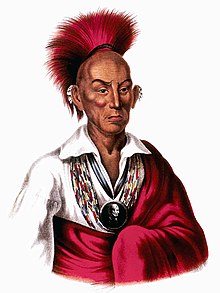Black Hawk War
The Black Hawk War of 1832 was the last Indian war in the United States east of the Mississippi River.
In 1804, the governor of the Indiana Territory, General Harrison, made a treaty with the Sauk and Fox at St. Louis, whereby they sold their land east of the Mississippi. They were to be allowed to remain there, however, as long as the land was in the possession of the United States Federal Government. In return they received $2,234.50 in goods and an annual payment of $1,000. In 1809, this area became part of the Illinois Territory, which became the State of Illinois in 1818.
Toward the end of the 1820s, the American government decided to move all the Indians out of Illinois to make way for settlers. Indian agent Thomas Forsyth informed the Sauk in May 1828 that they were to move to the west side of the Mississippi River. The Sauk chiefs denied that they had ever ceded any land. The view prevailed, however, that they had nothing to oppose the Americans. In the fall of 1829, therefore, they seceded across the Mississippi River to what is now Iowa, vowing never to return. On July 15, 1830, a new treaty on the subject was signed at Prairie du Chien.
However, Chief Black Hawk returned with some men in the spring of the following years. Many settlers left their new home out of fear. Black Hawk invoked the treaty; since all the land had not yet been sold, it was his right to be here. Illinois Governor John Reynolds, however, considered this an invasion and called out a militia to drive the Indians "dead or alive" to the other side of the Mississippi. General Gaines then pledged troop aid if talks with Black Hawk proved fruitless.
Gaines met with Sauk chiefs east of the Mississippi River in June 1831. Most professed to return. Black Hawk enlisted help from neighboring Kickapoo, Winnebago, and others. However, when the troops received reinforcements from the militia, of which Abraham Lincoln was the most prominent member a year later, Black Hawk gave in on June 30, 1831, and returned west.
Sometime later, the Winnebago prophet White Cloud invited the Sauk to his home, which was near the Sauk's old home. On April 6, 1832, Black Hawk and 400 men and their families peacefully crossed the Mississippi River. But when one of his emissaries was gunned down, Black Hawk vowed revenge. On August 1 and 2, his force was defeated by volunteers under General Atkinson at the Bad Axe River. On August 27, Black Hawk surrendered and was taken prisoner. Black Hawk was released in August 1833. Black Hawk County in Iowa is named after him.
On September 21, 1832, the Sauk ceded their land in Illinois in exchange for $640,000. Although Chief Black Hawk was not involved, this act became known as the Black Hawk Purchase. The land that was signed over was also called the Black Hawk Purchase.

Black Hawk
Search within the encyclopedia